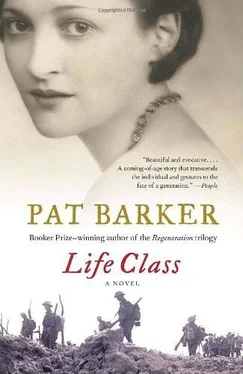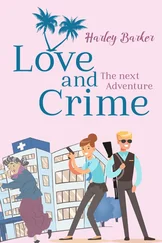On the platform the soldiers, no longer laughing, shouldered their kitbags and marched off. The civilians left behind looked fragmented and shabby after the uniforms and the disciplined vigorous movement. A porter told them to go into the waiting room, where an officer sat behind a table checking papers.
Elinor positioned herself towards the rear of the line of nurses, making sure, though, that she wasn’t the last. Her mouth was dry, but she could see that the officer was bored doing this routine, unglamorous job and perhaps a little soporific too after a good lunch. A coil of expensive blue smoke rose into the air above his head. His colour was high. He looked as if he liked wine and cigars and women. Boredom and resentment might make him aggressive, but not when there were young women to be flirted with and impressed. She saw him pull his stomach in as soon as he noticed them, and had to stifle a giggle, though it was more from fear than amusement. He kept the first girl — a bank manager’s daughter from Bradford — chatting. Her blushing face and schoolgirl French did make her entrancing. The second girl got much the same treatment, but then a third, a fourth … He looked at the row behind, asked the first girl if they were all together, and when she nodded he stood up and waved them through. Looking back, Elinor saw him settling down again, disconsolately, to face an old man, a married couple and two middle-aged sisters laden with suitcases.
Paul was waiting just inside the arch that led out of the station on to the open muddy street. Whenever she’d tried to imagine this scene he’d always been wearing the long black coat he’d worn last winter at the Slade, but of course he was in uniform, breeches, puttees, tunic, peaked cap, with a Red Cross armband on his right arm. He was looking away from her so that she saw his face in profile, and felt, for a moment, quite detached. A response to his own stillness, his own detachment.
He looked Egyptian, she thought, and not just because of his olive skin. Something about the nose and the heavy-lidded, slanting, dark eyes. It was a face made to be seen in profile, and the straight shoulders and narrow waist reinforced the impression. Perhaps that was why, when, lying in bed at night, she tried to think of him, he was always looking away. Surely you ought to be able to remember a close friend smiling, looking straight into your eyes? But she never could, and she didn’t know whether this detachment came from him or from her.
‘Paul?’
He turned, then, and his face flashed open in a smile that made him immediately look ordinary. She started towards him, but he shook his head, holding up a card he carried with her name on it. In the story they’d concocted, he was merely somebody from the hospital sent to meet a young woman he didn’t know. She drew back, scanned the crowd, eventually allowed herself to notice him standing there, walk forward, greet him and shake him warmly by the hand.
‘There you are.’ He took her bag. ‘This way. I’ve got a cab waiting.’
He took her arm as they crossed the road, but no more than a light pressure on her elbow.
‘We could walk, but I thought with the bag … And you must be tired?’
A quick sideways glance. He seemed shy with her, but then she’d hardly looked at him, except at his profile in the station. Her mind was full of what was to come. Or not. Somehow the theoretical possibility she’d been entertaining that they would spend a few days together as friends had vanished. They’d met as lovers, though awkward, insecure, self-doubting lovers.
Since she couldn’t look at him, she felt she ought to at least raise her eyes and take in the town, but that too seemed to be beyond her. All she could see was muddy boots and swishing skirts and shopping baskets dangling from meaty arms.
Out of the corner of her eye cab wheels appeared. He opened the door and the step tilted as she got in. He gave the address to the driver and walked round to the other side, his weight balancing the vehicle as he sat down beside her. The driver clicked his tongue, lashed the bony horse, and they lurched forward. Paul had been leaning out to close his door when the cab started, and the movement threw him back heavily against the leather seat, and he slid into her. He tried to push himself away. She was afraid they were about to have a stilted conversation about her journey, but then they looked at each other — his eye whites were startling in the gloom of the cab’s interior — and they were kissing, jolted against each other, teeth jarring, losing the other’s mouth and finding it again. She was afraid to stop because then she’d have to look at him and see a stranger. At last they separated, and it was a stranger, white-faced, breathless, black-eyed, Paul as she’d never seen him. She clutched his hand with slippery fingers and they smiled at each other; a brief respite from terror.
‘I’ll have to go back to the hospital. Just for a few hours. You’ll be all right?’
She nodded. ‘Yes.’
Trying to calm herself, she turned and looked out of the window. They were rattling along a cobbled road, tall white houses on either side, their walls dazzling in the late-afternoon sun. Soldiers kept passing on either side. For a time the cab ran along by the side of a canal with tethered barges and tall spindly trees that had begun to strip for winter, their bright yellow leaves twirling down to lie on the brown, smooth, reflecting surface of the water. She took it all in, indelibly; she’d remember those leaves in ten, twenty, forty years’ time, though if she’d been asked fifteen minutes later to describe them she couldn’t have done so.
‘I think you’ll like the room,’ Paul said. ‘It’s a good room to paint in.’
She nodded, though painting was so obviously not what he had in mind that she wanted to laugh, and had to turn aside to hide a smile.
At last they stopped. Paul got out, helped her down and paid the driver. She found herself staring at a narrow doorway in a tall narrow house. Paul knocked and a few seconds later the door was opened by a woman in a blue apron with bare arms as muscular as a man’s and a cloud of fine dark hair lightly streaked with grey. This was Madame Drouet. She greeted Paul with obvious delight, Elinor with considerably more reserve, then led the way upstairs, her broad backside swaying massively from side to side under a dark blue skirt. A caryatid’s backside, Elinor thought — not that you ever saw such a thing — built to hold up the world.
Her room — their room? — was right at the top of the house. The doors to the other rooms stood open and seemed to be storerooms, as far as she could tell. She glimpsed a mattress propped against the wall, and a dolls’ house with two green bay trees painted on either side of the front door. Madame Drouet stopped, turned the stable latch and opened the door on to a white-painted room that was full of light. Elinor went straight to the window. Far below was a narrow back garden, but she was looking out over angled roofs and attic windows. Turning back into the room, she saw a big bed — a bed that seemed to be getting bigger by the minute — a chair with a rush seat, a marble-topped table with a blue-and-white bowl and jug, and a wardrobe with a tarnished mirror set into the door.
‘It’s lovely’ she said, in English.
Paul translated, but it wasn’t necessary. Madame Drouet’s face had already cracked into a smile. ‘I hope you will be very happy here.’
As she spoke a shaft of sunlight reached the brass knobs on the bed, and they winked, knowingly, at Elinor. She had a vague, but vivid, sense that the room was more than a room, that it contained her future. Madame Drouet was still smiling. She likes it that we’re not married, Elinor thought. She likes the idea of illicit sex on the top floor of her house, or perhaps she likes the idea of Paul having illicit sex in her house. Madame Drouet closed the door, still smiling, and, like the Cheshire Cat, seemed to leave her smile hanging in the air after the rest of her had gone.
Читать дальше












